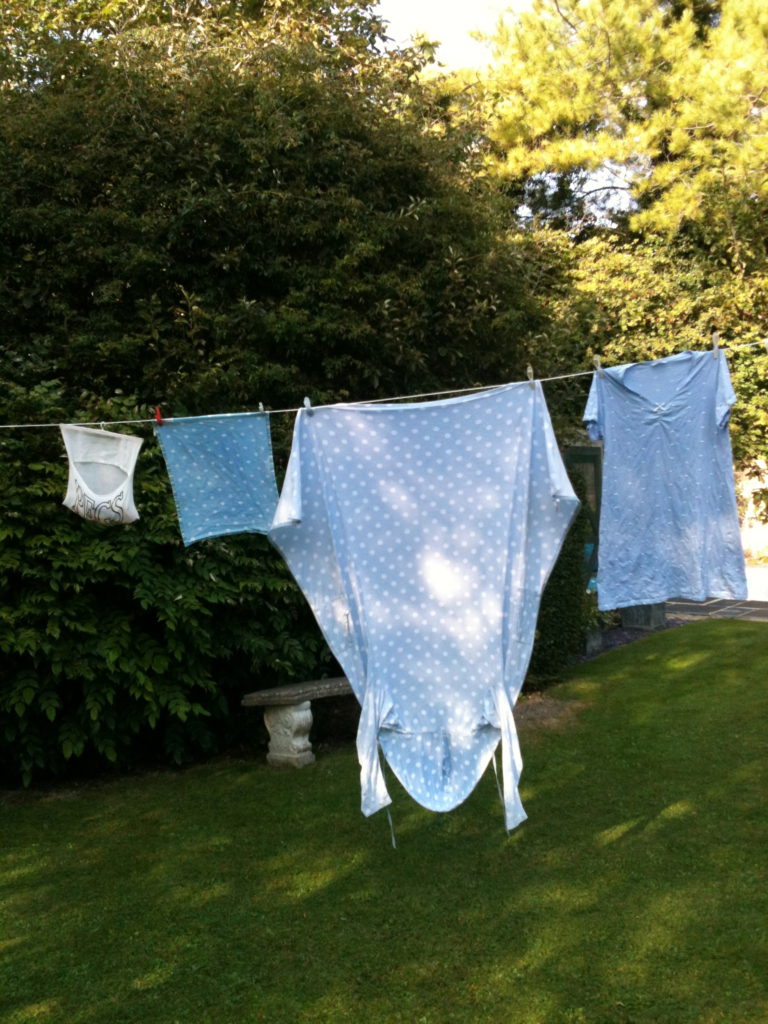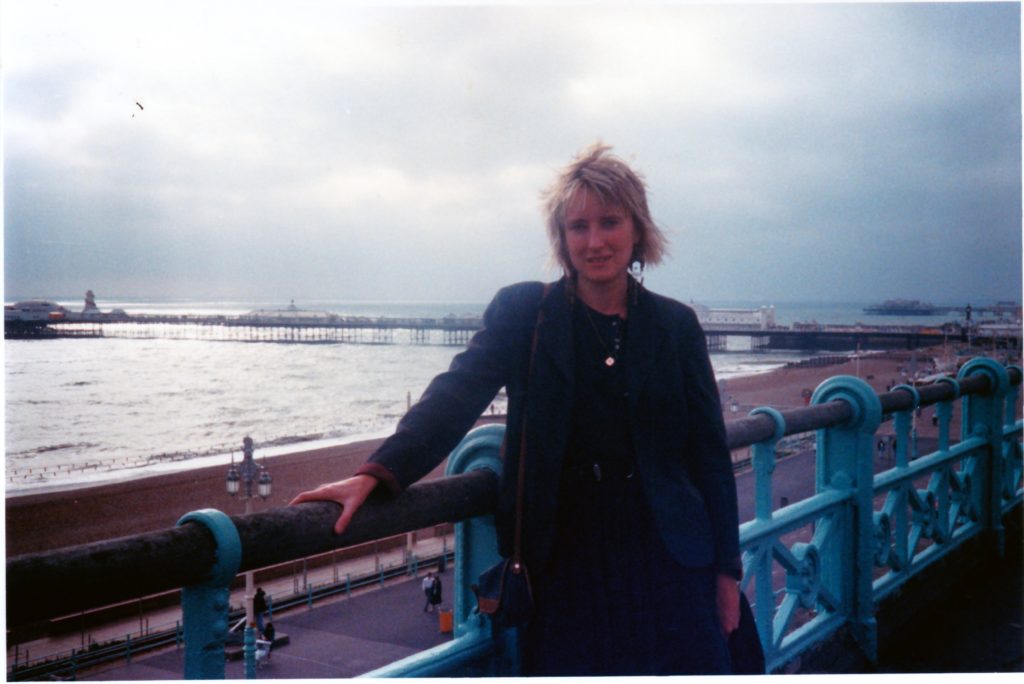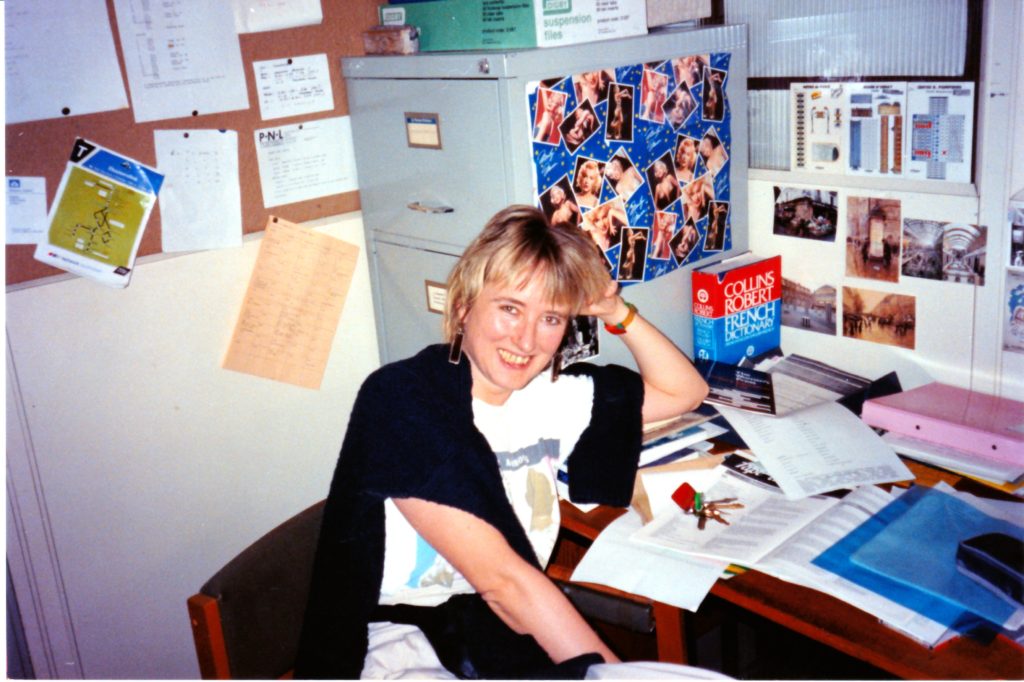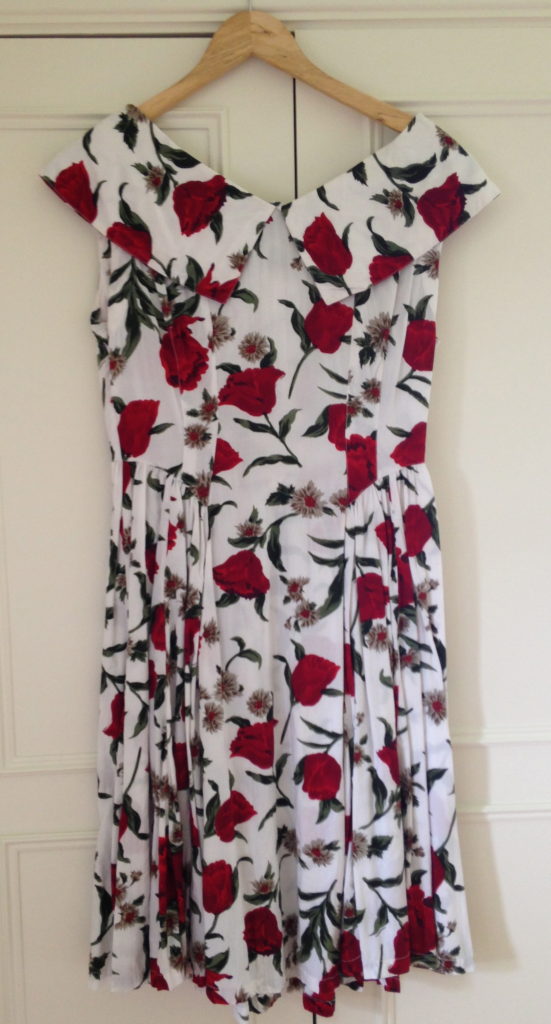I limped through 2013, constant pain mitigated slightly by exercises and drugs. I began to think of myself as disabled. Not getting a parking place near my destination could reduce me to tears. When I enquired about parking at the University someone from ‘Occupational Health’ told me that I could use buses to get round Campus. I never worked that one out. Real help came from a kind librarian who gave me access to the disabled entrance so that I did not have to cope with Basil Spence’s statement staircase.
In July 2014 Catherine came to visit and was horrified by my transformation into an old woman bent over a stick. Then, in that same month I finally overcame my terror of hospitals and surgery and went in for a hip replacement. They promised me pre-op Diazapam, but on the day I was told sternly (and correctly) that this was not going to happen. After the operation I hated my short-lived dependency on the nurses, whose kindness brought tears to my eyes. I was lucky to undergo the operation in a specialised arthritis clinic, with one of the best hip surgeons in the country, and wonderful nursing and physio – on the NHS. I was in the clinic for two nights, then home, walking on two sticks. The man who had invited me to dinner in Merton College in 1972, now a world famous surgeon himself, came to see me with his son, a medical student. They took great interest in my recovery, and found it quite remarkable.
For me, it was a miracle to be able to walk again, without pain. Exactly a week after the operation I put on new lime-green shorts and went out to revisit Virginia Woolf’s house at Rodmell. There was a semi-spontaneous reading of ‘Flush’ in the garden, and I read one of the female parts, leaning on my sticks.
By December that year, it was possible to contemplate the kind of holiday where you are on your feet all day long, exploring a city, looking at art. We went to Venice with friends, and stayed in a simple but beautiful hotel on the Grand Canal, opposite the fish market. We woke every morning to scenes of the deliveries to the market, of vaporetti packed with people going to work. In the evenings we drank prosecco in the deserted lounge of the hotel, then went out for dinner, and more walking, until beauty could keep us awake no longer. It was, in every sense, a renaissance.
A year later, in November 2015 we returned to the same hotel, with the same friends. The miracle was repeated. I bought a coat in a designer shop that at first I hardly dared to enter. But I could not resist the chance to practice my Italian, and to try on the coat I had spotted through the window. It shone out at me, and when I put it on, the sensation of lightness and warmth merged with my delight in my regained ability to walk. The coat was the outer expression of the prosthesis that had restored me. It was also the polar opposite of the dressing gown I had slumped around in for over a year. A garment for going out into the world, a feminine take on the pleasures of the flâneur. The old mac I had brought with me to Venice, that just did not look right among the elegant Italian women, was thrown back into the suitcase. In the coat I felt European, not English, and with a new confidence I booked tables in crowded restaurants, ordered meals for the group and exchanged pleasantries in my basic Italian. On Friday 13th we stumbled on the University degree ceremony in St Mark’s Square. For the rest of the evening the streets were full of young people wearing their laurel crowns, celebrating with friends and families, singing an obscene song. We were carried along in the flow of joyous humanity.
On November 14th, we woke to the news of the Paris attacks. Anxiety about friends, text messages, reassurance, tears. I lit a candle in the church of San Salute, for the victims, for another European city I had grown to love, for the attack on conviviality, joy and pleasure, on the mixing of diverse people in urban spaces.
We returned home, and a few weeks later set out for Paris, where the welcome was warm, as if the mundane act of getting on the Eurostar was now a statement of solidarity. I had my picture taken in the coat, in our hotel room, before going to lunch with Annie, the writer whose work has illuminated my life for more than two decades, and whose friendship was, is, so precious to me.
July 2016. The Venetian coat is the last garment to be pegged on my clothes line.
In recent weeks (and years) the national and international news has made me rage and weep and rage again. On the morning of the referendum on Britain’s EU membership I delivered leaflets to the bungalows near our village, in high humidity and then rain. I returned home exhausted, conscious of the futility of my efforts, wishing I had started earlier, done more. Social media debates and a split in my own family added a new and painful personal twist to political issues. In the family row that blew up over Brexit I realised more than ever that I am separated from my family by social class, by my education, and that underneath the affection and everyday chats, there is resentment and anger: ‘You are never here’ one relative protested. I muttered about monthly visits, the M25, the seven hour journey home, in turn angry and guilt-ridden. My visits are like a royal progression. In preparation floors are washed, windows cleaned, tables dusted. They buy olive oil (the wrong kind) and Greek yoghurt, and wonder what to cook for my delicate middle-class tastes. My views on Brexit, on immigration make them uncomfortable, angry. What do southerners from Sussex villages know about how Wolverhampton has changed, what the town used to be like, and is no more? In the result they won, I lost, but in the longer term, of course, we all lose.
A week after the referendum we flew to Nice, then on by taxi to Villefranche-sur-mer.
When we tell the taxi driver that after this we are going on to Marseilles, he comments ‘Marseille, c’est l’Afrique’. He complains about paying too much tax. We spend an idyllic week with a dear Canadian friend, trying not to think about Britain’s impending isolation from the rest of Europe, the racist attacks, and new energy of the extreme Right in Britain and elsewhere. On the beach police officers make a group of young black people pick up litter they have supposedly dropped. They argue about every piece.
We visit the now state-owned villas of the Côte d’Azur for the first time, our hearts warmed, souls fed by their beautiful, luxuriant gardens and decadent, slightly camp interiors. A day trip to Nice. The narrow streets of the old town, a market, warmth, sunshine, insouciance. On the way back to the station we notice armed soldiers and comment on how ineffective their presence is, just a symbolic gesture aiming to convince the public that things are under control.
In Marseilles we spend the warm evenings in our friends’ garden, eating delicious food, commiserating on the state of Europe and the world, gazing admiringly at their thriving flowers and vegetables in the midst of a desert landscape. It has not rained for months, trees are dying. The honey harvest will be poor. We can scarcely imagine our own damp, snail and slug infested garden. The next day we drive north to look at the lavender fields in bloom, something I have always wanted to do, a dream realised. The intense purple stripes fading towards the horizon are almost too beautiful to contemplate. Japanese tourists pose among the blooms, women carrying parasols, in fear of the sun. We swim in the cool waters of a lake, picnic, return to our friends’ house. Easyjet whizzes us uncomfortably home the next day.
Days later, on Bastille day, Nice becomes a scene of carnage. I email my Canadian friend to check she is safe. She and her companion had an aperitif at the hotel Négresco that night, wondered whether to stay for dinner and fireworks. But they had left-over chicken in the fridge, so they went home.
We have a new government, we are the laughing stock of the world. I discover that the new Prime Minister studied at the same Oxford college as me, that in my fourth year she was in her first. Not very strangely, we never met. I imagine she would have had little time for me as I was then – disillusioned about my Oxford education, lost, looking for love. Perhaps I saw her marching briskly across the gardens of St Hugh’s to her tutorial, the efficient essay in her hand written well in advance.
This winter I will wear my Venetian coat again, I will be culturally European. The prime of life; so far from ‘the best of all possible worlds’.
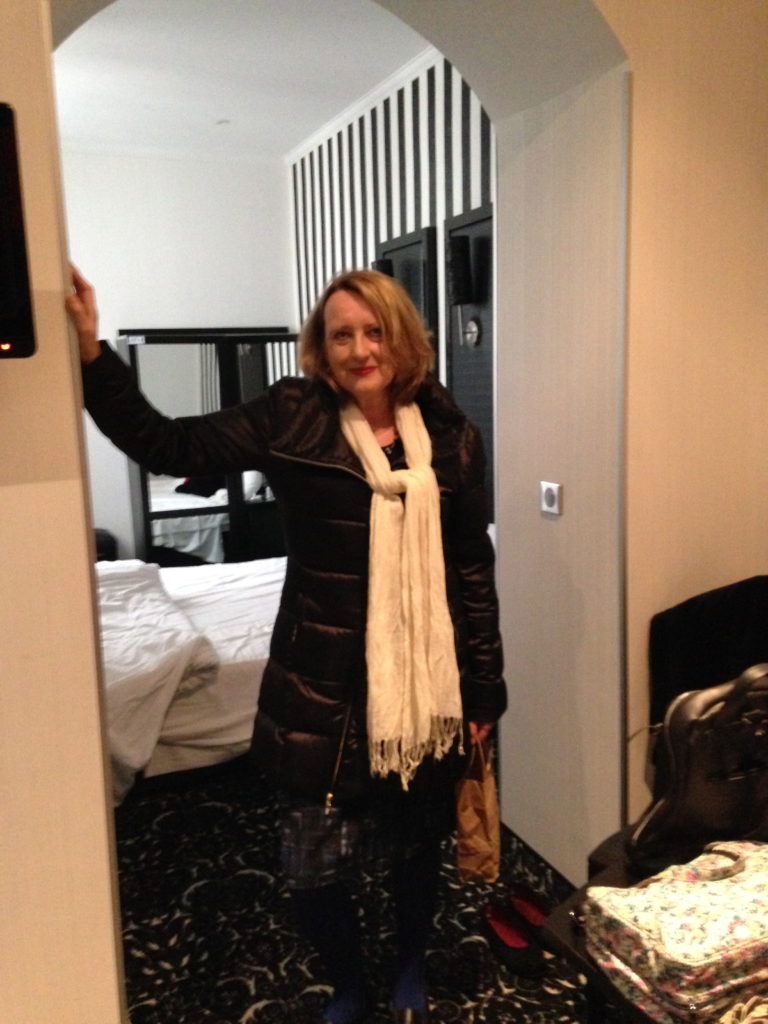
Paris, in the coat, December 2015.
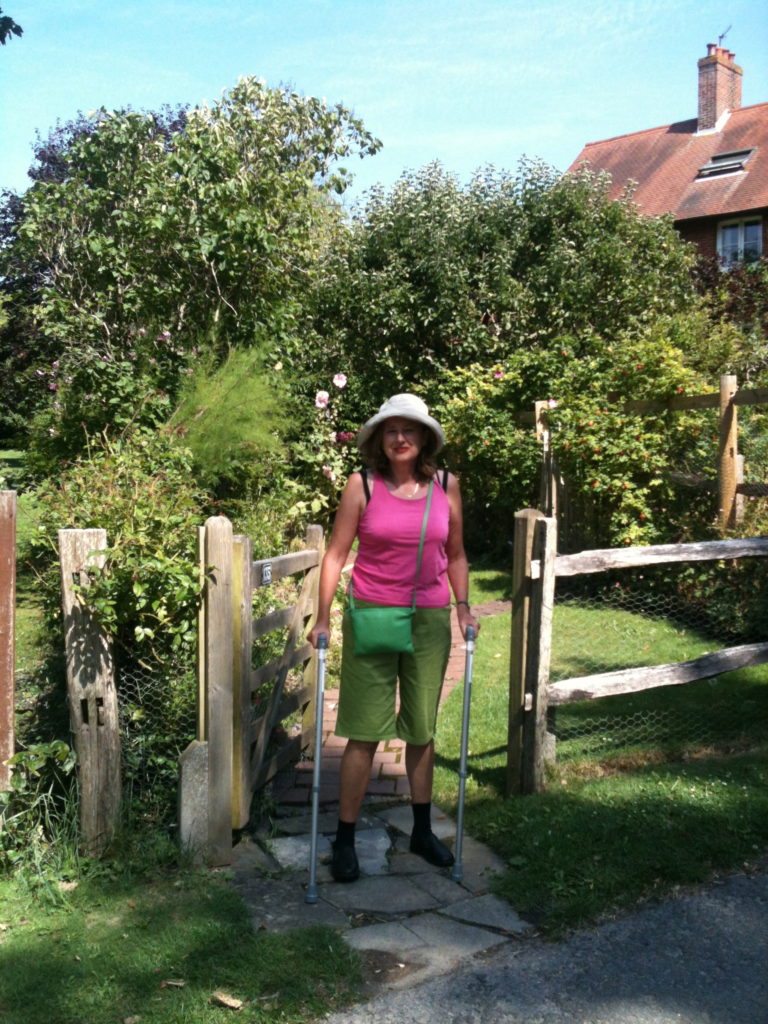
Post-op, July 2014, in the new lime-green shorts, and the pink vest from 1987.
